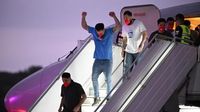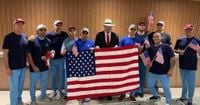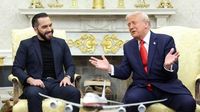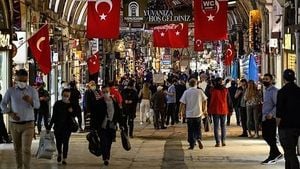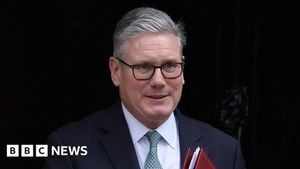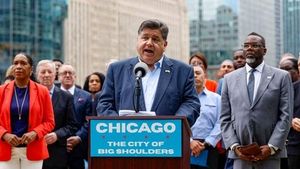In a dramatic and complex international prisoner swap finalized on July 18, 2025, the Trump administration facilitated the release of 10 Americans detained in Venezuela, trading them for more than 250 Venezuelan migrants who had been deported from the United States and imprisoned in El Salvador.
The agreement marked a significant diplomatic achievement involving the United States, Venezuela, and El Salvador, highlighting the intricate interplay of immigration policy, international relations, and human rights concerns. Secretary of State Marco Rubio announced the release, expressing gratitude toward President Donald Trump and Salvadoran President Nayib Bukele for their roles in securing the deal. Rubio emphasized the importance of the moment, stating, "Until today, more Americans were wrongfully held in Venezuela than any other country in the world. Every wrongfully detained American in Venezuela is now free and back in our homeland." He also called for the "restoration of democracy in Venezuela" and condemned the Maduro regime's use of unjust detention as a political tool.
Salvadoran President Nayib Bukele confirmed the handover of all Venezuelan nationals detained in El Salvador, many accused of gang affiliation, in exchange for the Americans and Venezuelan political prisoners held by Caracas. Bukele described the operation as the result of "months of negotiations with a tyrannical regime that had long refused to release one of its most valuable bargaining chips: its hostages." The Venezuelan government confirmed receiving 252 deportees from the U.S., including seven children separated from their parents during the deportations.
The Venezuelan men had been held in the Terrorism Confinement Center (CECOT), a notorious maximum-security prison in El Salvador built as part of Bukele's aggressive campaign against gangs. The Trump administration had deported these men in March 2025 under the rarely used Alien Enemies Act of 1798, a wartime law invoked to expedite their removal. The administration accused many of these deportees of belonging to the violent Tren de Aragua gang, though much of the evidence rested on questionable grounds such as tattoos—some referencing autism or football teams rather than criminal affiliations.
Legal challenges have questioned the constitutionality of the deportations and the evidence used to justify them. Several judges have ruled that the Trump administration overstepped its authority by invoking wartime powers to deport these migrants. The American Civil Liberties Union has sued the administration over these actions, highlighting concerns about due process violations. Many deportees had active asylum cases or had entered the U.S. legally through ports of entry, as documented by the libertarian Cato Institute and investigations by The New York Times. In fact, only 32 of the deported men had serious criminal accusations, while the majority had no criminal records beyond immigration offenses.
Among those deported and returned to Venezuela is Andry Hernandez Romero, a gay makeup artist who fled persecution for both his sexuality and political views. Hernandez Romero's tattoos, alleged by authorities to indicate gang membership, were actually nods to local cultural celebrations. His case is a lead example in the ongoing legal battles challenging the Trump administration's use of the Alien Enemies Act.
On the American side, among the released detainees was Wilbert Joseph Castañeda, a former Navy SEAL who had been detained in Venezuela since August 2024. Castañeda's family described his detention as politically motivated, noting his traumatic brain injuries from military service may have influenced his decision to travel to Venezuela despite risks. Other Americans had been seized by Venezuelan authorities as part of a broader crackdown on dissent since President Nicolás Maduro's contested reelection in July 2024, which was widely criticized for alleged fraud. Maduro's government has detained activists, opposition members, and union leaders in a campaign to suppress opposition, holding nearly 1,000 political prisoners, including 88 with foreign citizenship, according to watchdog group Foro Penal.
The prisoner swap also included the release of an unspecified number of Venezuelan political prisoners held in Venezuela, a move welcomed by U.S. officials. Rubio praised the release and reiterated calls for the unconditional freedom of remaining unjustly detained political prisoners and foreign nationals.
This exchange comes amid ongoing tensions between the U.S. and Venezuela. While the Trump administration does not recognize Maduro's presidency, it has engaged in negotiations through special envoys such as Richard Grenell, who secured earlier releases of detained Americans. The Maduro government has used the detention of Venezuelan migrants in El Salvador as a political tool to criticize the U.S., portraying their imprisonment as human rights violations.
El Salvador's role in the deportation and detention of Venezuelan migrants has also drawn scrutiny. The U.S. reportedly paid El Salvador $6 million to house the deportees in CECOT, a prison criticized by human rights groups for documented cases of torture, beatings, and hundreds of deaths. Salvadoran officials, including Bukele, have maintained that the deportees were gang members, though critics and lawyers dispute these claims, citing lack of evidence and the use of superficial markers like tattoos to label individuals.
The legal and humanitarian implications of deporting migrants to third-party countries where they have no ties remain contentious. The swift deportations disrupted ongoing asylum proceedings and left many vulnerable to harsh prison conditions. Families of the deportees have campaigned tirelessly for their release, organizing protests and appealing to international bodies.
Negotiations for the prisoner swap had been ongoing for months, with some delays caused by conflicting offers from U.S. officials, sowing confusion about the terms. The deal was finalized just as the Trump administration imposed sanctions on leaders of the Tren de Aragua gang, underscoring the complex intersection of immigration enforcement and foreign policy.
As the Venezuelan deportees return home, their futures remain uncertain. Many fled Venezuela to escape persecution, and questions linger about whether they will face renewed imprisonment or political repression. Advocates hope that their release will shed light on the conditions they endured during their four months of detention in El Salvador.
Ultimately, this prisoner swap reflects the complicated realities of international diplomacy, immigration enforcement, and human rights in a fraught geopolitical landscape. It underscores the human cost behind policy decisions and the ongoing struggles of individuals caught between nations.
